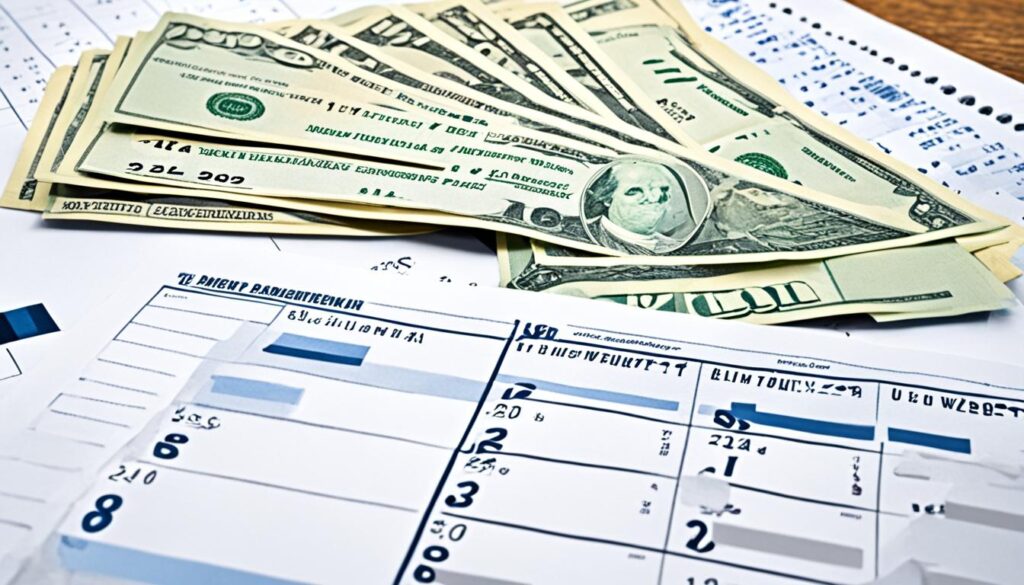Are you dreaming of financial freedom? Picture this: You’re sitting on a sun-kissed beach, with the warm ocean breeze gently caressing your face, knowing that you no longer have the heavy burden of debt weighing you down. It may seem like a distant dream, but with an effective debt repayment strategy, you can turn that dream into a reality.
Meet Jessica, a hardworking professional who was determined to break free from the chains of debt. Like many others, she had a mortgage that seemed to stretch on forever. However, Jessica discovered a game-changing strategy: bi-weekly mortgage payments.
When Jessica learned about the power of bi-weekly payments, she was initially skeptical. But after crunching the numbers and realizing the amount of interest she could save, she decided to give it a try. Instead of making one full mortgage payment each month, she started making half payments every two weeks.
Little did Jessica know, this simple change would have a profound impact on her debt repayment journey. By making bi-weekly payments, Jessica effectively made an extra full mortgage payment each year. She was astounded by the results. Not only did she save a significant amount of money on interest, but she also managed to shorten the term of her loan.
With each passing month, Jessica felt a renewed sense of hope and progress. The weight of debt slowly lifted off her shoulders, and she could see the light at the end of the tunnel. Bi-weekly payments proved to be the key that unlocked her path to financial freedom.
If you’re ready to take control of your financial future and crush debt faster, it’s time to consider bi-weekly mortgage payments. It’s a simple yet effective strategy that can save you money on interest and accelerate your journey towards a debt-free life.
Key Takeaways:
- Bi-weekly mortgage payments involve making half of your mortgage payment every two weeks instead of one full payment each month.
- By making bi-weekly payments, you end up making one additional full mortgage payment per year, which can save you a significant amount of money on interest.
- Bi-weekly payments can help you pay off your mortgage faster and reduce the term of your loan.
- This payment structure aligns well with your pay schedule and allows for easy budgeting.
- Switching to bi-weekly payments can be an effective debt reduction strategy, providing you with a clear path towards financial freedom.
What are Biweekly Mortgage Payments?
Bi-weekly mortgage payments are a smart financial strategy that can help you save money on interest and budget more effectively. Instead of making one full mortgage payment each month, bi-weekly payments involve making half of your mortgage payment every two weeks.
This payment structure is particularly advantageous for individuals who are paid bi-weekly, as it aligns well with their pay schedule. By making bi-weekly payments, you end up making one additional full mortgage payment per year, resulting in interest savings and an accelerated path to debt reduction.
Additionally, the extra paychecks that come twice a year can be used to make the half payments. These extra funds allow you to make larger payments toward your mortgage principal, further reducing the amount of interest you pay over time.
Bi-weekly mortgage payments allow you to save money on interest and pay off your mortgage faster, all while effectively managing your budget.
Switching to bi-weekly payments can have a significant impact on your mortgage debt. Let’s take a look at an example:
| Mortgage Principal | Interest Rate | Loan Term | Savings with Bi-weekly Payments |
|---|---|---|---|
| $200,000 | 4% | 30 years | $20,000+ |
Using a mortgage principal of $200,000, an interest rate of 4%, and a loan term of 30 years, switching to bi-weekly payments can save you over $20,000 in interest over the life of the loan. This demonstrates the potential impact of bi-weekly payments on interest savings and debt reduction.
In addition to saving money on interest, bi-weekly mortgage payments offer the convenience of aligning with your bi-weekly pay schedule. It allows for easier budgeting and ensures that your mortgage payments fit comfortably into your financial plan.
Making the switch to bi-weekly payments is a simple and effective way to save money and pay off your mortgage faster. However, there are a few things to consider before making the change:
- Check with your mortgage lender to ensure that they allow bi-weekly mortgage payments without any prepayment penalties or additional fees.
- Make sure that each payment is immediately applied to the accrued interest and principal, rather than being held until the regular due date.
- Avoid paying a third-party agency to switch your payments for you, as they may charge unnecessary fees.
By following these tips and fully understanding the terms and conditions of your lender regarding bi-weekly payments, you can make a smooth transition and take advantage of the benefits it offers.
Bi-weekly mortgage payments are a powerful financial tool that can help you save money, reduce your mortgage debt faster, and achieve your financial goals. By leveraging the extra paychecks and making regular, half payments, you can make significant progress in your journey towards financial freedom.
How Do Biweekly Mortgage Payments Work?
Bi-weekly mortgage payments work by following a specific payment schedule. If you pay your mortgage on Fridays, every other Friday, you would make a half payment. Most months, you will make two payments that equal the amount of your current monthly payment. However, two months out of the year, you will make an extra half payment due to the 52-week structure of the year. This results in making 26 payments instead of the usual 12.
By making these extra payments, you can save a significant amount of interest over the long term. Let’s take a closer look at how the payment schedule and extra half payment contribute to interest savings.
When you make bi-weekly payments, the extra half payment made twice a year goes directly toward reducing the principal balance of your mortgage. This reduces the amount of interest that accrues on your loan over time.
By shortening the time frame in which interest can compound, you can save a substantial amount of money on interest charges. The more frequently you make payments, the less time and opportunity there is for interest to accumulate.
Additionally, the 52-week structure of the year aligns with bi-weekly payments, allowing for the extra half payment to be made seamlessly without disrupting your budget. This means you can save on interest without experiencing any financial strain or discomfort.
By following the bi-weekly payment schedule and making the extra half payment, you can take advantage of the interest savings potential and accelerate your journey towards debt freedom.
Advantages of Biweekly Mortgage Payments
Bi-weekly mortgage payments offer several advantages for homeowners looking to pay off their mortgage faster and save money on interest. Here are some key benefits:
- Set-it-and-forget-it: Bi-weekly payments allow you to automate your mortgage payments, giving you peace of mind and eliminating the need to remember payment due dates. Once you set up the bi-weekly payment plan, you can sit back and let the system take care of the rest.
- Easy budgeting: With bi-weekly mortgage payments, the smaller payments align well with your pay schedule, making it easier to budget and plan your monthly expenses. You can break down your mortgage payments into manageable amounts that fit more comfortably within your budget.
- Automatic early mortgage payoff: By making bi-weekly payments, you can effectively pay off your mortgage earlier than the scheduled term. Since you’re making an extra payment each year, it helps to reduce the principal amount more quickly and minimize the amount of interest accrued over time. This can potentially save you thousands of dollars in interest payments.
Switching to bi-weekly mortgage payments offers financial benefits and a convenient repayment strategy. It provides an avenue to save money on interest, simplify your budgeting process, and expedite the journey to becoming mortgage-free.

How Much You Can Save with Biweekly Payments
Bi-weekly mortgage payments can result in significant savings on interest. By switching to bi-weekly payments, you have the opportunity to reduce the amount of interest you pay over the life of your loan, ultimately leading to debt reduction and interest savings. Let’s break down the potential impact.
Using a mortgage principal of $200,000 at 4% for 30 years as an example, switching to bi-weekly payments can save you over $20,000 in interest over the life of the loan. Additionally, you can pay off the mortgage four years sooner.
By making more frequent payments, you’re able to reduce the outstanding balance of your loan sooner, which in turn decreases the amount of interest that accrues. This means more of your money goes towards paying down the principal, resulting in accelerated debt reduction. The table below illustrates the potential interest savings and reduction in loan term for a $200,000 mortgage with a 4% interest rate over 30 years:
| Payment Frequency | Total Interest Paid | Loan Term |
|---|---|---|
| Monthly | $143,739 | 30 years |
| Bi-Weekly | $123,635 | 26 years, 4 months |
As you can see, by making bi-weekly payments, you can save over $20,000 in interest and pay off your mortgage more than 3 years earlier. This demonstrates the significant impact of bi-weekly payments on debt reduction and interest savings.
To calculate your own potential savings, you can use a bi-weekly payment calculator. This tool allows you to input your mortgage details, including the principal, interest rate, and term, to estimate the interest savings and reduced loan term that can be achieved through bi-weekly payments.

Key Takeaways:
- Bi-weekly mortgage payments can result in substantial interest savings and debt reduction.
- Switching to bi-weekly payments can potentially save you over $20,000 in interest on a $200,000 mortgage over 30 years.
- You can pay off your mortgage four years sooner by making bi-weekly payments.
- Use a bi-weekly payment calculator to determine your own potential savings based on your mortgage details.
Tips for Making the Switch to Biweekly Payments
When considering the switch to biweekly payments, it’s essential to keep a few tips in mind to ensure a smooth transition and maximize your benefits. By following these recommendations, you can make the most of your new payment frequency while avoiding unnecessary fees and potential pitfalls.
- Check with your mortgage lender: Before implementing biweekly payments, it’s crucial to first confirm with your mortgage lender that they allow this payment frequency. Some lenders may have specific terms or conditions, so ensuring that biweekly payments are supported will help you avoid any complications or misunderstandings later on.
- Verify prepayment penalties: Additionally, inquire about prepayment penalties associated with your mortgage. Some lenders may charge fees or penalties for paying off your loan earlier than the agreed-upon terms. By understanding the existence of prepayment penalties, if any, you can make an informed decision regarding whether biweekly payments are the right choice for you.
- Ensure immediate payment application: One critical aspect of biweekly payments is ensuring that each payment is immediately applied to the accrued interest and principal. Some lenders may hold the payments until the regular due date, reducing the potential benefits of biweekly payments. To maximize your interest savings and shorten the term of your loan, it’s important to confirm that the payments are applied promptly and effectively.
- Avoid third-party agencies: While there may be third-party agencies offering services to switch your mortgage payments to a biweekly schedule, it is generally recommended to avoid utilizing these services. Third-party agencies often charge fees for their services, which can add unnecessary expenses to your already existing mortgage obligations. By switching your payments directly with your lender, you can avoid these additional costs and streamline the process.
By considering these tips, you can ensure a successful transition to biweekly payments, taking full advantage of the benefits they offer in terms of interest savings and accelerated debt reduction.
Comparing Payment Frequencies
| Payment Frequency | Principal & Interest Payment Amount | Total Payments per Year | Interest Savings | Loan Term Reduction |
|---|---|---|---|---|
| Monthly | $1,000 | 12 | $0 | No reduction |
| Biweekly | $500 | 26 | $20,000 | 4 years |
As demonstrated in the table above, switching to biweekly payments can result in significant interest savings and a shortened loan term. By making half of your monthly payment every two weeks, you can save thousands of dollars in interest over the life of your loan. Additionally, the accelerated payment schedule allows you to pay off your mortgage four years earlier, helping you achieve financial freedom sooner.
How Does a Bi-Weekly Payment Plan Compare to a Debt Management Plan for Crushing Debt Faster?
When comparing a bi-weekly payment plan to effective debt management plans, the latter allows for a more comprehensive approach to tackling debt. While bi-weekly payments can help pay off debt faster, a debt management plan provides a structured strategy for reducing and eliminating debt through negotiation and financial counseling.
How Can Bi-Weekly Payment Plans Help with Debt Repayment?
Bi-weekly payment plans can accelerate debt repayment. By using a debt repayment calculator to strategize your payoff, you can see how making bi-weekly payments can help you save on interest and pay off your debt faster. This method can help you stay on track and achieve financial freedom sooner.
Conclusion
Bi-weekly mortgage payments are more than just a debt repayment strategy – they can be your ticket to financial freedom. By adopting this approach, you have the power to reduce the amount of interest you pay over time and potentially shorten the term of your loan. These payments offer several advantages, such as easy budgeting and the opportunity for automatic early mortgage payoff.
By understanding the potential interest savings and following the tips we discussed earlier, you can develop an effective debt reduction plan tailored to your needs. Imagine the relief and satisfaction of paying off your mortgage sooner, gaining financial freedom earlier than expected.
So why wait? Make the switch to bi-weekly payments and take control of your financial future. By adopting this simple yet powerful strategy, you can expedite your journey to financial freedom and create a brighter financial outlook for you and your loved ones.
FAQ
What are biweekly mortgage payments?
Biweekly mortgage payments involve making half of your mortgage payment every two weeks instead of one full payment each month.
How do biweekly mortgage payments work?
Biweekly mortgage payments follow a specific payment schedule where you make a half payment every other week. This results in making 26 payments per year instead of the usual 12.
What are the advantages of biweekly mortgage payments?
Biweekly mortgage payments offer several advantages, including being a set-it-and-forget-it type of payment structure, aligning well with your pay schedule, and helping you plan your finances effectively.
How much can you save with biweekly payments?
By switching to biweekly payments, you can potentially save a significant amount of interest over the life of the loan. For example, with a mortgage principal of $200,000 at 4%, you can save over $20,000 in interest and pay off the mortgage four years sooner.
What tips should I consider when switching to biweekly payments?
It’s important to check with your mortgage lender to ensure they allow biweekly payments without any prepayment penalties or extra fees. You should also make sure each payment is immediately applied to the accrued interest and principal, and avoid paying a third-party agency to switch your payments for you.

